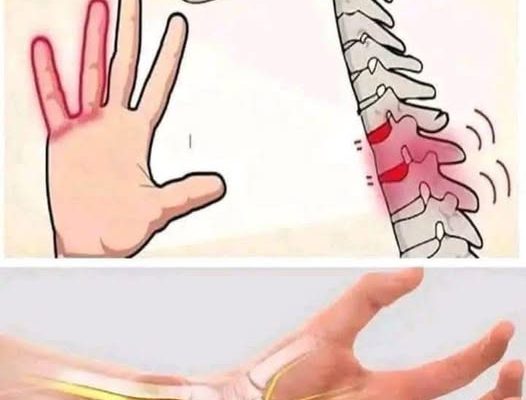Feeling a sudden rush of numbness or tingling in your hands can be jarring. Many people describe it as a “pins and needles” sensation — sometimes fleeting, sometimes persistent, and often difficult to ignore. While these sensations can occasionally be harmless, they can also serve as important signals from your body. Understanding the potential causes can help you recognize when the issue is minor and when it might require medical attention.
Everyday Causes
One of the most common reasons for waking up with numb or tingling hands is simply your sleeping position. Resting on your arm, wrist, or hand for too long can put pressure on nerves and restrict blood flow. This temporary compression interferes with nerve signaling, causing the familiar tingling. Usually, shifting position is enough to restore circulation and normal sensation within minutes.
Another frequent cause stems from repetitive hand movements. Modern life demands a lot from our hands — hours spent typing on keyboards, scrolling on phones, operating tools, or engaging in crafts and hobbies. These repetitive motions can strain the nerves and tendons over time. Carpal tunnel syndrome is a well-known example: it develops when the median nerve is compressed as it travels through a narrow passage in the wrist. The result is tingling, numbness, and sometimes weakness in the hand.
Nutritional Deficiencies and Electrolyte Balance
Nerve health depends on proper nutrition. A deficiency in vitamin B12, for instance, is strongly linked to nerve problems. Without adequate B12, the protective covering of nerves can deteriorate, leading to sensations of tingling or numbness in both hands and feet. People who follow strict vegetarian or vegan diets are particularly vulnerable, as B12 is primarily found in animal-based foods. Conditions that impair absorption, such as Crohn’s disease or pernicious anemia, can also increase the risk.
Electrolytes — minerals like sodium, potassium, and calcium — are crucial for transmitting electrical signals in the nervous system. If these levels fall out of balance, nerve communication can falter. Dehydration, certain medications, or medical conditions that interfere with electrolyte regulation can all trigger abnormal sensations in the hands.
Chronic Health Conditions
Underlying health conditions can also play a significant role. Diabetes is one of the leading causes of nerve damage worldwide. Prolonged high blood sugar levels can injure peripheral nerves, which connect the brain and spinal cord to the rest of the body. This complication, known as diabetic neuropathy, often begins with tingling or numbness in the hands and feet and may progress to pain or loss of sensation.
Spinal issues are another possible culprit. Herniated discs in the neck or age-related changes such as cervical spondylosis can compress nerves where they exit the spinal column. Because these nerves travel into the arms and hands, the compression may cause tingling, numbness, or even sharp shooting pains radiating down the arms.
Autoimmune disorders may also cause nerve-related symptoms. In rheumatoid arthritis, inflammation can affect not only joints but also nearby nerves. In Guillain-Barré syndrome, the body’s immune system mistakenly attacks nerve tissue, leading to widespread weakness and tingling. While less common, these conditions highlight how numbness in the hands can sometimes point to systemic disease.
Circulatory Problems
Healthy nerves rely on good blood flow. Any condition that restricts circulation can contribute to tingling sensations. Raynaud’s phenomenon, for example, causes small blood vessels in the fingers and toes to narrow in response to cold temperatures or stress. This temporarily limits blood supply, producing numbness, tingling, and color changes in the skin.
More serious circulatory issues, such as atherosclerosis (the buildup of plaque in the arteries), can also reduce blood flow to the hands. When tissues don’t receive enough oxygen, nerves are among the first to react.
Nerve Compression and Other Causes
Sometimes, physical structures like cysts or tumors can press directly on nerves. Ganglion cysts, which are fluid-filled lumps that often appear near wrist joints, may interfere with nerve function. The result is localized pain, tingling, or restricted movement.
Infections can also be to blame. Shingles, caused by the reactivation of the chickenpox virus, can damage nerve endings and produce tingling or burning pain in affected areas, including the hands. Lyme disease, spread through tick bites, is another infection that may cause neurological symptoms.
When to Seek Medical Help
Occasional tingling that resolves quickly may not require urgent attention. However, persistent, worsening, or unexplained numbness should not be ignored. Medical evaluation is essential if tingling in the hands is accompanied by:
- Weakness or paralysis.
- Slurred speech, confusion, or dizziness.
- Loss of coordination or balance.
- Numbness spreading beyond the hands to other areas of the body.
These symptoms could signal serious conditions such as stroke, multiple sclerosis, or advanced nerve damage that require immediate care.
The Takeaway
Numbness or tingling in the hands can arise from something as simple as sleeping awkwardly or working too long at a keyboard, but it can also signal deeper problems ranging from nutritional deficiencies to chronic illness. Paying attention to the pattern, frequency, and severity of your symptoms can provide valuable clues.
If the sensations are persistent or troubling, consult a healthcare professional. They may recommend physical exams, blood tests, imaging, or nerve conduction studies to identify the cause. Early diagnosis and treatment not only provide relief but also prevent potential complications.
Your body’s signals matter. By listening to them and acting promptly, you take an important step toward protecting your nerve health and overall well-being.



